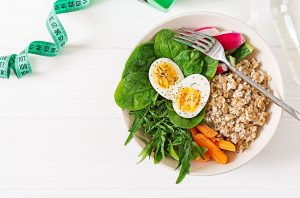 When it comes to weight loss, the first thing that comes to mind is slaving away on the treadmill, going for long jogs or joining a gym. But apart from physical activity, there are other factors that influence weight loss like nutrition, quality of sleep and how well you manage stress. Let’s look at some nutritional factors and determine if it is possible to lose weight through diet.
When it comes to weight loss, the first thing that comes to mind is slaving away on the treadmill, going for long jogs or joining a gym. But apart from physical activity, there are other factors that influence weight loss like nutrition, quality of sleep and how well you manage stress. Let’s look at some nutritional factors and determine if it is possible to lose weight through diet.
1. Burning more calories than you consume
The most helpful approach for weight loss is to reduce the number of calories you eat and increase the number of calories you burn through physical activity. One should aim on getting into a negative calorie balance. i.e. you eat less calories and burn more calories and give a chance to stored fats to get metabolized. This can be achieved by taking small steps such as cutting down on carbs, while increasing protein rich food in your diet to meet the daily nutrition requirements. Avoiding packaged foods, high salt and sugar foods, and focussing more on seasonal fruits, vegetables and local native millets can go a long way.
2. Calorie Deficit and What You Need To Keep In Mind
Our body weight is determined by the amount of calories we consume as food and the amount of calories we burn through physical activities. If you’re gaining weight over time, most likely your daily calorie intake is more than the number of calories you are burning through your daily activities.
In order to counteract this, it is important to cut back on calorie intake and burn more calories. Over a period of time, this strategy helps in burning the stored fats and ultimately helps in weight loss. For instance, there are 7,700kcals of energy in 1kg of fat. That means in order to burn 1kg of fat, you should have a calorie deficit of 7,700 i.e. either burn this through exercise or eat less calories on a daily basis. A combination of both these ways is most successful and stable over a long period of time. Changing our eating habits along with regular exercise is the most effective way to lose weight over a period of time. It is also the best way to ensure that the weight does not bounce back with slight deviations.
3. Balancing Diet With Activity
One needs a proper combination of diet, cardio workouts and weight training. Diet definitely plays a huge role in managing weight, however, without proper training or physical activity, the weight lost will keep bouncing back. So one needs proper calorie burn though cardio activities and also lean muscle gain that can happen through weight training.
4. Include More Fiber In Your Diet
Fiber is extremely important in a weight loss journey. Fiber makes up the bulk of your meals. It helps in keeping you full for longer – not starving or feeling hungry all the time is extremely important in a weight loss journey. Eating more fiber also prevents spikes in blood sugar levels. Soluble fiber present in oats, apples, carrots and beans forms a gel-like structure in the gut and slows the absorption of sugars which helps in preventing fat build up.
Is It Possible To Lose Weight Through Diet Alone?
A simple answer to this would be no. It is not possible to lose weight through diet alone. By eating lesser calories, you are creating a deficit but usually it is not sufficient to lose weight. Even if one loses weight by extreme dieting or food restriction, the weight quickly bounces back as what you have lost in a short period is just body water and muscle. In order to have sustainable weight loss, it is important to combine calorie deficit through reduced dietary intake and also a minimum 60 minutes’ combination of daily cardio and strength or weight training workouts to lose fat and gain lean muscle.
We hope this article helps you! For more on weight loss, check out Healthy Reads. To get expert advice and guidance on weight loss, reach out to our experts by subscribing for personalised health coaching here: https://goqiiapp.page.link/bsr
#BeTheForce
 Let’s face it! We all struggle to eat healthy sometimes and after a while, we turn to fad diets or some “miracle food” to help us ease the guilt of having eaten something unhealthy. While a lot of information is available on the internet about eating healthy, it also causes a lot of confusion as most of the content isn’t authentic and could do more harm than good. So what exactly is Eating Healthy comprised of?
Let’s face it! We all struggle to eat healthy sometimes and after a while, we turn to fad diets or some “miracle food” to help us ease the guilt of having eaten something unhealthy. While a lot of information is available on the internet about eating healthy, it also causes a lot of confusion as most of the content isn’t authentic and could do more harm than good. So what exactly is Eating Healthy comprised of? Every nutritionist suggests you improve your fiber intake, particularly because of the role it plays in aiding with fat loss, reducing the risk of coronary heart disease and cancer. It plays a key role in digestive health and creating a sense of fullness, which essentially means that enough fiber can help you lose weight!
Every nutritionist suggests you improve your fiber intake, particularly because of the role it plays in aiding with fat loss, reducing the risk of coronary heart disease and cancer. It plays a key role in digestive health and creating a sense of fullness, which essentially means that enough fiber can help you lose weight!



